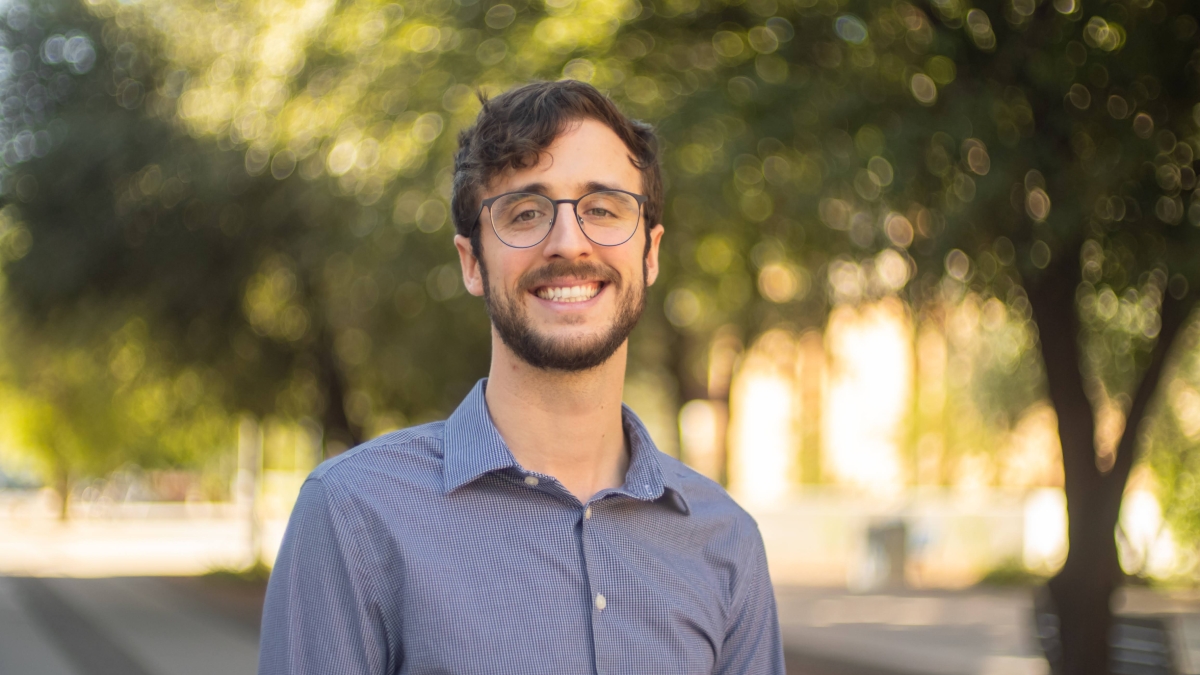ASU psychology student aims to change the addiction conversation

Matthew Broussard is a graduate student in the addiction psychology master’s degree program at ASU.
Addiction is a challenge that hits people in different ways. Often substances that one person has no issue with can become problematic for another person, and Matthew Broussard, an ASU Online graduate student in the addiction psychology master’s degree program, hopes to find out why this is.
“Substances as a whole are utilized in our culture for a ton of different reasons. We use coffee to be stimulated and be more focused at work. We use alcohol to relax and unwind with friends. Some subgroups of Indigenous tribes use plants for ceremonial purposes or religious purposes,” Broussard said. “But there seems to be a problem with some people using those tools or those drugs to cope with traumas or depression or anxieties in a way that's maladaptive and detrimental to their health.
“I'm really interested in focusing on why are some people able to utilize these substances in a positive way, in a way that's adaptive and can help them in their life, and why are some people using it in a way that is detrimental to their lives?”
Broussard graduated from the Department of Psychology with bachelor's degrees in psychology and philosophy and continued to earn a master’s degree in the science of health care delivery from the College of Health Solutions. While in this program he was named an NSF scholar in the Graduate Research Fellowship Program and conducted research on the impact of childhood trauma on substance use. He also conducted research as an undergraduate research assistant in the Substance Use, Health, and Behavior Lab, the Social Addictions Impulse Lab and the Clinical and Translational Science Lab.
As an undergraduate, he founded the Ecstasis Club, which focused on leading academic conversations and workshops surrounding altered states of consciousness. In the context of psychoactive drugs, they hosted seminars on harm reduction and provided educational resources for prevention purposes.
“Right now I’m transitioning into client-based practice for more clinical experience, getting my license and owning an addictions counseling firm. I previously studied health care delivery at the Downtown (Phoenix) campus, which was more of an administrative approach to health care and research,” Broussard said.
Broussard aims to own a private addictions practice in the future and hopes to continue on to a clinical psychology doctoral program. He understood the necessity of gaining hands-on training for a more holistic approach to health care.
“My strategy is to take a holistic approach without having judgment because there is a lot of shame involved. There is a lot of guilt involved. Removing judgment and focusing on being able to just try to understand what's going on in a patient’s life and how can we help is a really beneficial approach because a lot of providers don’t get that right,” he said.
Broussard knows from personal experience the impact that trauma and addiction can have on a family.
“Throughout my childhood, I've been exposed to certain family members using substances in a very negative way and I can see how that impacted our family dynamic. I was really interested in understanding the underlying mechanisms even from an early age. Why were certain members able to manage substance use without any issues and others couldn’t?”
He was drawn into the Master of Science in addiction psychology program because it is an accelerated program with required practicum hours guided by professionals with decades of experience. The program is not just specific to licensure in Arizona, so the coursework and hours are broadly applicable to licensure in other states as well.
“I really don't know where I'm going to end up. But this program allows me to have a lot of possibilities. I can look at the requirements for licensure in other states and see if I meet those requirements or what other steps are necessary,” Broussard said. “This master's program has been very applicable, and it's really cool to take the skills that we learn and immediately apply them into our clinical setting.”
More Science and technology

Will this antibiotic work? ASU scientists develop rapid bacterial tests
Bacteria multiply at an astonishing rate, sometimes doubling in number in under four minutes. Imagine a doctor faced with a…

ASU researcher part of team discovering ways to fight drug-resistant bacteria
A new study published in the Science Advances journal featuring Arizona State University researchers has found…

ASU student researchers get early, hands-on experience in engineering research
Using computer science to aid endangered species reintroduction, enhance software engineering education and improve semiconductor…